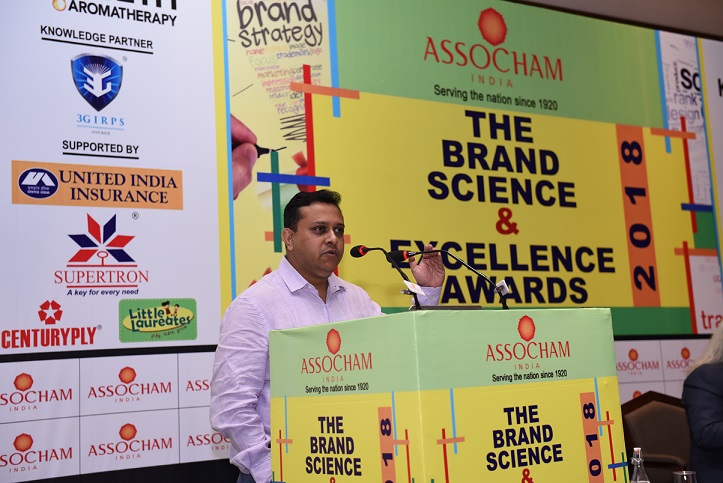What is the key to motivation and happiness? The answer lies within a simple word. Appreciation. Recognition motivates us to work harder.
And that’s what happened on 24th August at ITC Sonar, Kolkata when the esteemed ASSOCHAM India recognized us as the Most Promising Digital Agency of 2018.
We, in our journey of creating a mark in the industry and throttle ourselves on the list of the best since our inception half a decade prior, have managed to produce some remarkable brand campaigns that finally resulted in this prestigious award, just like multiple awards that we recieved before that.
For instance, Plastic Menace, a campaign responsible for instigating a mass social media revolt against plastic usage that we run for an NGO, was primarily instrumental for winning this award.
The ASSOCHAM event – the Brand Science & Excellence – was a full house which boasted of stalwarts like H.E. Dr. Sabit Subasic, Hon’ble Ambassador, Bosnia & Herzegovina for India, Mr. Anil S. Nair—CEO and Managing Director, L&K Saatchi and Saatchi, India, Mr. Subash Kamath—CEO and Managing Partner, BBH India, ASSOCHAM dignitaries, and many more.
After a few enriching sessions delivered by Mr Nair and Mr. Kamath, came the moment we all were waiting for—a debate on a thoroughly exciting topic— Is building brands very different in a digitally disrupted world?
The topic was bang on!, in resonance with what exactly the strategy and perception should be for a company venturing out in the online space, or for large enterprises who are looking for ways to keep up with the explosive rise of digital marketing across all sectors.
Our Director and Co-founder of UrsDigitally, Mr. Amitava Bhattacharya was among the four people who were invited to form the debate panel. As the discussions grew intense and the clash of perceptions gained momentum, Amitava’s contrarian views on branding gained a unified nod from the audience while the rest of the panellists disagreed. The debate got very engaging and gruelling at the same time.
So, what did Amitava say that provoked the eminent personalities from big ad agencies to fiercely oppose his view?
According to Amitava, branding is very contextual and proportionate to the stage of business. He feels that for the small business / start ups, traditionally perceived branding (story telling) is more of a luxury. Instead what they need is growth hacking to drive ROI on marketing and advertising. Once the business starts getting some traction, then you can drive branding to reach out to the mass media.
And a big chunk of that credit goes to e-commerce platforms or market places. Amitava explains—“Today branding has become totally relative. It’s upon you if you go for the long drawn marketing strategy comprising of a extensive consumer research, competitive analysis, marketing ideation extrapolation, and a lot more, or take the shorter route of piggybacking on the disruptive ad technologies/ social media / market places etc”.
“E-commerce has totally levelled out the field for big brands and their smaller counterparts alike and today products from both the brackets are available on the same page for the customers to see. ”, says Amitava.
In today’s digitally disrupted world, a brand with a little budget can directly reach out to its target customers at any stage of the funnel – intent / consider / purchase. Thanks to the disruptive ad technologies and the popularisation of e-commerce market places, now a smaller brand can compete with the bigger ones. Without going through the long drawn process of brand building, now a business can create their growth story with SMART digital marketing strategies.
For Exclusive Digital Workshops write to us at reachus(at)ursdigitally.com, or contact us here
In last few years we have seen two biggest changes in marketing.
With the e-commerce exploding in emerging markets branding has now become equivalent to the business model. From paid media the power has shifted onto the earned media – peer recommendations.
Perhaps the biggest change that digitalization has brought in the world of branding and marketing is ‘customer engagement’.
And, who is to judge whether your product deserves to be right there on top of the growth curve? It’s the audience and the customers themselves. Today, customer engagement is a two way street. Brands really do not control the perception.
With poor products or services, it is just not possible to hide today. Customers can now speak, and most importantly they are heard too.
But something has not changed though.
There are a few fundamental brand building principles – customer orientation, customer segmentation, and consistent messaging at every consumer touch point – that have become more important than ever.
Social Listening is the key.
A brand must understand the psychology of its customers – not only of what they need the product to do for them but how they want the product to make them feel.
The need for fine-grained customer segmentation is another major aspect that is further accentuated by the advent of digital technologies. These days, the brands need to continuously assess and re-assess their targeting and be flexible enough to take a re-course if needed.
Third point – consistent messaging across all the channels is something that brands often falter with. Consistency does not mean ‘identical’. Today customers interact with a brand in different media channels in many different ways. For example, how they interact on Facebook / Instagram may be totally different when they engage with the same brand on Twitter.
Combining consistency with agility and transparency is critical.
One of the way brands can earn trust online is through their transparent approach with messaging. It certainly helps to create the loyalty and advocacy of digital natives for the brands.
For Exclusive Digital Workshops write to us at reachus(at)ursdigitally.com, or contact us here
It was certainly a very refreshing session that opened new ways of seeing the world of branding and digital marketing. It is worth re-emphasizing that a brand represents a collection of its customers’ perceptions of how they see the brand, how they feel about it, and what they say about it. With so much of disruptions by Digital, it will be right to assume that the brands who can extend their value propositions beyond just products and services and can clearly establish what they truly stand for will win the new age customers.





